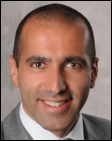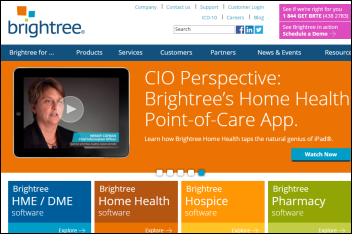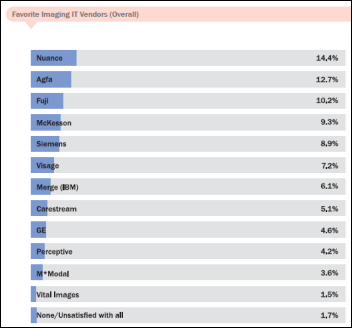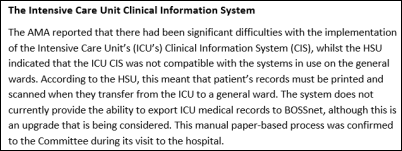Thank you for the mention, Dr. Jayne — we appreciate the callout, the kind words and learning more about the…
Monday Morning Update 11/30/15
Top News
Billionaire Patrick Soon-Shiong, burned by poor IPO and biotech markets that evaporated $1 billion of the value of his NantKwest following its July IPO, postpones his planned IPO of NantHealth. “There is no reason to go out in a bear market,” he says.
Reader Comments
From Turkey Trotter: “Re: poll idea. How do readers pronounce HIStalk?” You can vote here. It’s always been H-I-S-talk for me, but I don’t know which is more common know since I rarely hear it spoken by anyone else as I write it in solitude. The name’s back story is that when I first started putting random thoughts online back in 2003, the old blogging tool I was using (Blog City) required entering a site name. The term for hospital IT back then was “hospital information systems,” and from that, I quickly (and not very creatively) came up with “HIStalk.” Not that it really mattered since literally nobody was reading other than me.

From Publius: “Re: New York-Presbyterian. I predict they will go Epic in the next 1-2 years. They are the only major NYC healthcare organization not on Epic, new CIO Daniel Barchi was CIO at two Epic organizations, and a plethora of experienced Epic consultants will be available from NYC Health + Hospitals, NYU, HSS, Montefiore, etc.” I had the same thought as soon as I heard Daniel was going there, plus the Weill Cornell physician group is already on Epic while the rest of the organization is on Allscripts. A NYP contact tells me they aren’t planning to look elsewhere, but I would be surprise if they don’t at least consider it.
From Steeple People: “Re: clearinghouses. How many EMR/PM vendors own their own? And if they don’t, which one do they use?” Vendor folks are welcome to provide their answer by leaving a comment.

From Vince Ciotti: “Re: CPSI acquiring Healthland. CPSI’s revenue had flattened out in the last couple of years. Healthland’s customer base is very small facilities such as Critical Access Hospitals that have little funding as the company struggles to convert its Classic users to Centriq. CPSI has a strong sales and marketing team and must be aiming to sell Healthland customers its Thrive system – like Cerner acquiring Siemens, each replacement of the Classic system that will be sunsetted in two years will mean several million in booked revenue, quite a windfall for CPSI if they can make the sales. Healthland has made few new sales in the past few years and the privately held company has revenue of only around $80 million with 500 employees. It was acquired by Francisco Partners in 2007.” Vince has offered to do a webinar on the acquisition, which I think might be fun.
From Kaiser Cutter: “Re: programmer joke. A programmer’s wife asks him, ‘Can you pick up a loaf of bread, and if they have eggs, get a dozen?’ He returns home with 13 loaves of bread. She asks, ‘What happened?’ He said, ‘They had eggs.” I returned the favor with this one. Why do programmers always mix up Halloween and Christmas? Because Oct 31= Dec 25.
HIStalk Announcements and Requests

Sixty percent of poll respondents think everybody — not just covered entities — should be regulated by federal patient privacy laws. Mak doesn’t want taxpayers footing the bill for the inevitable bureaucracy, but HIT Geek says we need a common, simple nationwide privacy standard that can be easily enforced by built-in mobile device security controls. New poll to your right or here: where will you get your 2016 medical insurance? Click the Comments link on the poll after voting and let me know whether you’re happy with your coverage and its cost.


Our DonorsChoose project provided an iPad for the Nevada first grade class of Mrs. Sensibaugh, who says the students are using it daily to study math and language concepts. She adds, “My students have been motivated and truly excited to use this wonderful technology. They can’t believe that someone actually cares so much about their education that they would donate such a wonderful, thoughtful gift.” Mrs. Owen from Indiana says that only two students per class have their own calculators and rulers, with our donation of 25 of each allowing students to perform dimensional analysis, mole conversion, and density graphing. I like how she attached them to clipboards and labeled them.
One of my recurring off-topic rants is the ridiculous price of razor blades, whose non-interoperable cartridges are so expensive that many stores bizarrely lock them away with the electronics. I found a solution: a safety razor like my grandfather used and high-quality blades that cost $9 per hundred (all blades fit all razors). The blades are not only good for several shaves, but are also double-sided, so I figure the $9 worth will last me for at least 2-3 years. Now I just need to convince people of the absurdity of high-technology cars riding on expensive and dangerous rubber balloons.
Last Week’s Most Interesting News
- CPSI announces that it will acquire small-hospital systems competitor Healthland for $250 million, also giving the company a presence in 3,300 skilled nursing facilities.
- AcademyHealth takes over the Health Datapalooza conference.
- A research firm predicts that ransomware will infect medical devices for the first time in 2016.
- The DoD announces that its Joint Legacy Viewer, which allows users to view combined data from the VA’s systems and its own, meets the federal requirement that the two organizations deploy interoperable systems.
- A court rules that Tata Consultancy employees who downloaded proprietary Epic material while posing as client consultants constitutes “inside hacking.”
Webinars
December 2 (Wednesday) 1:00 ET. “The Patient is In, But the Doctor is Out: How Metro Health Enabled Informed Decision-Making with Remote Access to PHI.” Sponsored by Vmware. Presenters: Josh Wilda, VP of IT, Metro Health; James Millington, group product line manager, VMware. Most industries are ahead of healthcare in providing remote access to applications and information. Some health systems, however, have transformed how, when, and where their providers access patient information. Metro Health in Grand Rapids, MI offers doctors fast bedside access to information and lets them review patient information on any device (including their TVs during football weekends!) saving them 30 minutes per day and reducing costs by $2.75 million.
December 2 (Wednesday) 1:00 ET. “Tackling Data Governance: Doctors Hospital at Renaissance’s Strategy for Consistent Analysis.” Sponsored by Premier, Inc. Presenters: Kassie Wu, director of application services, Doctors Hospital at Renaissance; Alex Eastman, senior director of enterprise solutions, Premier, Inc. How many definitions of “complications” (or “cost” or “length of stay”…) do you have? Doctors Hospital at Renaissance understood that inconsistent use of data and definitions was creating inconsistent and untrusted analysis. Join us to hear about their journey towards analytics maturity, including a strategy to drive consistency in the way they use, calculate, and communicate insights across departments.
December 2 (Wednesday) 2:00 ET. “Creating HIPAA-Compliant Applications Without JCAPS/JavaMQ Architecture.” Sponsored by Red Hat. Presenters: Ashwin Karpe, lead of enterprise integration practice, Red Hat Consulting; Christian Posta, principle middleware architect, Red Hat. Oracle JCAPS is reaching its end of life and customers will need a migration solution for creating HIPAA-compliant applications, one that optimizes data flow internally and externally on premise, on mobile devices, and in the cloud. Explore replacing legacy healthcare applications with modern Red Hat JBoss Fuse architectures that are cloud-aware, location-transparent, and highly scalable and are hosted in a container-agnostic manner.
December 3 (Thursday) 2:00 ET. “501(r) Regulations – What You Need to Know for Success in 2016.” Sponsored by TransUnion. Presenter: Jonathan Wiik, principal consultant, TransUnion Healthcare Solutions. Complex IRS rules take effect on January 1 that will dictate how providers ensure access, provide charity assistance, and collect uncompensated care. This in-depth webinar will cover tools and workflows that can help smooth the transition, including where to focus compliance efforts in the revenue cycle and a review of the documentation elements required.
December 9 (Wednesday) 12 noon ET. “Population Health in 2016: Know How to Move Forward.” Sponsored by Athenahealth. Presenter: Michael Maus, VP of enterprise solutions, Athenahealth. ACOs need a population health solution that helps them manage costs, improve outcomes, and elevate the care experience. Athenahealth’s in-house expert will explain why relying on software along isn’t enough, how to tap into data from multiple vendors, and how providers can manage patient populations.
December 9 (Wednesday) 1:00 ET. “The Health Care Payment Evolution: Maximizing Value Through Technology.” Sponsored by Medicity. Presenter: Charles D. Kennedy, MD, chief population health officer, Healthagen. This presentation will provide a brief history of the ACO Pioneer and MSSP programs and will discuss current market trends and drivers and the federal government’s response to them. Learn what’s coming in the next generation of programs such as the Merit-Based Incentive Payment System (MIPS) and the role technology plays in driving the evolution of a new healthcare marketplace.
December 16 (Wednesday) 1:00 ET. “A Sepsis Solution: Reducing Mortality by 50 Percent Using Advanced Decision Support.” Sponsored by Wolters Kluwer Health. Presenter: Stephen Claypool, MD, medical director of innovation lab and VP of clinical development and informatics for clinical software solutions, Wolters Kluwer Health. Sepsis claims 258,000 lives and costs $20 billion annually in the US, but early identification and treatment remains elusive, emphasizing the need for intelligent, prompt, and patient-specific clinical decision support. Huntsville Hospital reduced sepsis mortality by 53 percent and related readmissions by 30 percent using real-time surveillance of EHR data and evidence-based decision support to generate highly sensitive and specific alerts.
December 16 (Wednesday) 1:00 ET. “Need for Integrated Data Enhancement and Analytics – Unifying Management of Healthcare Business Processes.” Sponsored by CitiusTech. Presenters: Jeffrey Springer, VP of product management, CitiusTech; John Gonsalves, VP of healthcare provider market, CitiusTech. Providers are driving consumer-centric care with guided analytic solutions that answer specific questions, but each new tool adds complexity. It’s also important to tap real-time data from sources such as social platforms, mobile apps, and wearables to support delivery of personalized and proactive care. This webinar will discuss key use cases that drive patient outcomes, the need for consolidated analytics to realize value-based care, scenarios to maximize efficiency, and an overview of CitiusTech’s integrated healthcare data enhancement and analytics platform.
Contact Lorre for webinar services. Past webinars are on our HIStalk webinars YouTube channel.
Acquisitions, Funding, Business, and Stock
The Boston newspaper covers the previously announced sale of Partners HealthCare’s GeneInsight genetic testing software to Sunquest, which will pay Partners sales royalties. The article mentions similar software deals between Partners and Health Catalyst and Beth Israel Deaconess Medical Center and Athenahealth.
India-based healthcare software vendor Indegene Lifesystems expects to hit $250 million in annual revenue by 2020 and plans to go public within 2-4 years. The company says it will announce an acquisition in the next few days and is also in acquisition talks with an unnamed population health management analytics company.
Georgia-based Brightee, which offers durable medical equipment and hospice software, will expand R&D headcount at its Scotland offices to 150-200 employees. President and CEO Dave Cormack, who is from Scotland and was a director of Aberdeen Football Club, hopes to double annual sales to $240 million within 3-4 years.
People

Culbert Healthcare Solutions promotes Jaffer Traish to VP of its Epic practice.
Announcements and Implementations
Peer60 releases Trends in Medical Imaging Technology just in time for RSNA. It finds that radiology providers are most excited about breast tomosynthesis and cloud-based imagine sharing. VNA vendor preference is fragmented but Merge holds the lead, ACR Select enjoys a 60 percent mindshare in clinical decision support, and Nuance leads the “favorite imaging IT leaders overall” category.
GE announces the GE Health Cloud for its imaging devices. The company also announces Centricity radiology apps: Cloud Advanced Visualization, Multi-Disciplinary Team Virtual Meeting, Case Exchange, and Image Access Portal.
Government and Politics

Medical testing firm LabMD, which says it was driven out of business after seven years of fighting Federal Trade Commission charges of lax data security, fires back by suing three of the FTC’s lawyers for illegal and unethical prosecution. The FTC’s case, which was dismissed last week by a federal judge who found that no consumer harm occurred, was based on information from security vendor Tiversa. LabMD claims that Tiversa illegally hacked its systems and then threatened to expose the breach unless LabMD signed up as a Tiversa customer. LabMD CEO Michael Daugherty says the FTC should focus on real data breaches instead of potential ones and should be more transparent in conveying its expectations to companies, especially healthcare ones. He adds that FTC is made up of enforcement lawyers rather than technology experts and spent millions of taxpayer dollars pursuing his case, observing that HHS is a lot more willing to work with providers in trying to improve data security.
Other

In Western Australia, a government committee finds that 783-bed Fiona Stanley Hospital is still riddled with IT problems a year after an opening that was marked by delays and cost overruns. Employees report that a patient admission requires 15 minutes, the incompatible ICU system requires staff to print and scan a transferred patient’s record, and a poorly designed Wi-Fi system with limited coverage forces nurses to communicate via walkie-talkie. The report adds, “No hospital in the North Metropolitan Health Service is able to electronically access a medical record created at FSH,” although it concedes that given limited IT budget and skills, limited interoperability is reasonable and the new system is still better than paper records. The committee expressed concerns that no system in Australia can issue a delivery receipt for discharge summaries, leaving the sender unaware of whether it was received and acted upon appropriately.
In Australia, a cancer patient is given an incorrect chemotherapy dose due do a typo on a printed protocol form. Royal Adelaide Hospital’s hematology service noticed its error after six months and sent a group email with the subject line, “Updated AML … protocol uploaded.” Flinders Medical Center didn’t update its forms and gave the man half the desired dose. He’s one of 10 leukemia patients who were underdosed, of which two have relapsed and died. An independent review questions why Royal Adelaide sent a bland email that didn’t highlight the urgency of the required change and to alert clinicians that they likely underdosed their patients if they didn’t double-check the form’s incorrect dose calculations.

Samaritan Healthcare (WA) will spend $12 million to implement Epic, increasing its annual system maintenance cost from $500,000 to $2 million. According to the CFO, “It is a much, much more expensive system than we are using right now, so our whole trick is, how do we maximize the investment in the system? Because it will give us so much more and better information. Can we extract the information to reduce cost and improve care? That’s really what our task is as management.”
PatientKeeper offers a Thanksgiving-specific ICD-10 infographic.
Hospitals in England urge consumers to avoid their EDs on Tuesday as 40,000 junior doctors and their British Medical Association labor union plan a 24-hour strike on Tuesday during which they will treat only emergency patients. The doctors will strike again on December 8 and 16, but on those days they won’t treat any patients at all, even those with urgent conditions. BMA expects the government to send Army medical staff to cover the EDs. The residents are protesting a change proposed by Secretary of State for Health Jeremy Hunt that would expand hospital services to seven days per week following reports that patients are 15 percent more likely to die if admitted on Sunday instead of Wednesday. Junior doctors already work weekends and nights, but worry the proposed changes will cut their overall pay.
The Columbus, OH newspaper finds that Ohio’s medical records copying costs are among the highest in the country, as providers can charge $3.07 per page for the first 10, $0.64 for pages 11-50, and $0.26 for additional pages. Neighboring Kentucky, in contrast, mandates that providers give patients the first copy of their records at no charge. Actual charges for a 10-page record range from $3.60 at OhioHealth to $30.70 at Mount Carmel and Ohio State.
The New York Post reports that North Shore-LIJ Health System paid its president and CEO $10 million last year, much of it as a retirement payout even though he’s not retiring. New York-Presbyterian paid its CEO $4.6 million and gave several of its “honchos” housing allowances and chauffeurs, while Montefiore Medical Center paid its head $4.8 million. The state hospital association gave the standard checklist of excuses: it’s a tough job and the market is so competitive that hospitals would lose their executives if they didn’t pay them millions.
Vince Ciotti provides a tongue-in-cheek overview of system longevity.
Weird News Andy titles this story “To Womb It May Concern.” in which a not very convincing article (“it blew our minds,” reports the gushy writer) predicts that surgeons will within 5-10 years successfully transplant a uterus into a former male (transgender woman). WNA quotes Homer Simpson addressing Marge in bed: “But it’s uterus, not uter-you.”
Contacts
Mr. H, Lorre, Jennifer, Dr. Jayne, Dr. Gregg, Lt. Dan.
More news: HIStalk Practice, HIStalk Connect.
Get HIStalk updates.
Contact us or send news tips online.













Patient Privacy Laws. Be careful what you wish for. Open this door and the Feds will surely do something stupid — like try to regulate church prayer chains.
re: Kaiser Cutter…There are only 10 kinds of people that would like either of those programming jokes.
Those who know binary math and those who don’t!
RE Samaritan going to Epic. With the financial / reimbursement pressures that will continue to decimate bottom lines, how many organizations will eventually have to face the fact that what they pay for Epic is not worth the squeeze? I am not saying Epic is a bad system, it just have bad long term economics. Mr. HIS, can you comment?
[From Mr H] Some organizations chose Epic (and Cerner, for that matter) under better financial conditions, sometimes without a clear path to ROI. Maintenance costs are significant. However, there’s no competitive option — switching from Epic to Cerner or vice versa would entail another huge bump of expense and a lot of organizational turmoil and probably maintenance fees that are just as high, not to mention that the folks in charge would be admitting to their organizations that they bought champagne on a beer budget. That’s assuming they wouldn’t switch from either system to Meditech, which rarely happens. Lastly, many of the organizations running either Epic or Cerner are firmly convinced, with or without hard evidence to back it up, that they’re getting value from it, and Epic doesn’t negotiate based on the customer’s financial capabilities. I don’t think Epic or Cerner will lose many customers over money, although those customers may well try harder to negotiate their maintenance fees.
Here are a few emr/pm vendors that have their own clearinghouse –
Allscripts (from Payerpath acquisition)
McKesson (Relay Health)
Greenway (from GHN Online acquisition)
NextGen (from ViaTrack) – but use Gateway/Navicure
eCW – does not own their own clearinghouse – recommend any of 4 partners
GE – uses eCommerce from IDX acquisition (eCommerce is essentially Emdeon in the background)
Cerner – does not own their own clearinghouse
Epic – does not own their own clearinghouse
Embarrassed to admit it took me a minute to get the Oct 31 Dec 25 joke. Also surprised I’d never heard it before after 30 years in the HIT biz. Slowing down in my old age…
Math malaise: when every other number seems odd. (as seen on FB)
Nant? Bear market? How about crap product that provides zero value?